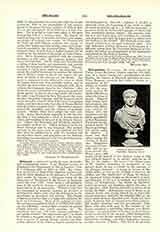

Helinand, a celebrated medieval poet, chronicler, and ecclesiastical writer; b. of Flemish parents at Pronleroi in the Department of Oise in France c. 1150; d. February 3, 1223, or 1227, or 1237. His talents won the favor of King Philip Augustus, and for some time he freely indulged in the pleasures of the world, after which he became a Cistercian monk at the Monastery of Froidmont in the Diocese of Beauvais about the year 1190. From being a self-indulgent man of the world he became a model of piety and mortification in the monastery. Whatever time was not consumed in monastic exercises he devoted to ecclesiastical studies and, after his ordination to the priesthood, to preaching and writing. The Church of Beauvais honors him as a saint and celebrates his feast on February 3. Many of his writings are lost. The extant ones (published in P.L., CCXII, 482-1084) are the following: twenty-eight sermons on various Church festivals; two ascetic treatises, viz. “De cognitione sui” and “De bono regimine principis”; one epistle entitled “De reparatione lapsi”, in which he exhorts a renegade monk to return to his monastery; a passio of Gereon, Victor, Cassius, and Florentius, martyrs of the Theban Legion (reprinted by the Bollandists in “Acta SS.”, October, V, 36-42); a. chronicle (from the beginning of the world to 1204) of which everything up to A.D. 634 has been lost; a. poem on death, in the French language, of which only four incomplete stanzas remain. His sermons, written in a neat Latin style, give evidence of a remarkable acquaintance with the pagan poets as well as with the Fathers of the Church. His chronicle is not sufficiently critical to be of much historical value. It is still undecided whether Helinand of Froidmont is a different person from the Cistercian Helinand of Perseigne, the author of a commentary on the Apocalypse and glosses on the Book of Exodus.
MICHAEL OTT

